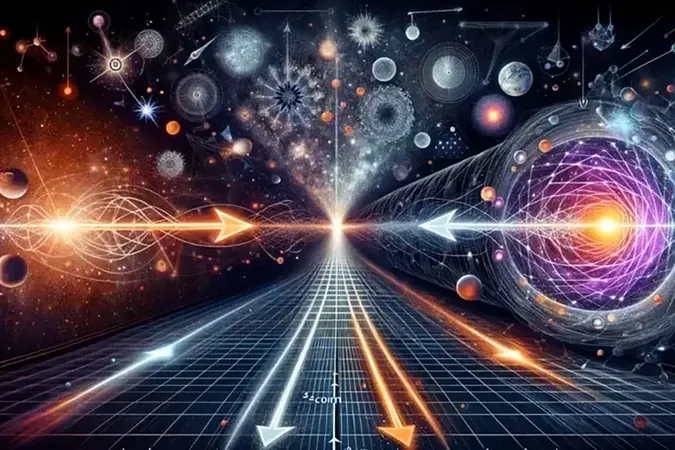
Is Time Just an Illusion? Groundbreaking Research Shifts Our Understanding!
2024-12-16
Author: Jessica Wong
Is Time Just an Illusion? Groundbreaking Research Shifts Our Understanding!
In a groundbreaking study that has the scientific community buzzing, researchers propose that time may not be the constant, unyielding force we always believed it to be — it could be a mere illusion arising from quantum entanglement!
At the forefront of this revolutionary theory is Alessandro Coppo, a physicist at the National Research Council of Italy. He states, "The correlation between the clock and the system creates the emergence of time, a fundamental ingredient in our lives." This bold assertion implies that time is not an absolute measure but rather a byproduct of quantum interactions that shape our reality.
Quantum Entanglement: The Key to the Mystery
The research team utilized the Page and Wootters mechanism, a concept proposed over thirty years ago, applying it to two distinct entangled quantum entities: a vibrating harmonic oscillator and a set of tiny magnets functioning as a clock. Astonishingly, their findings aligned perfectly with the Schrödinger equation, traditionally used to forecast the behaviors of quantum objects. However, instead of a conventional passage of time, their version operated according to the states of the tiny magnets.
Bridging the Gap Between Two Worlds
Historically, a significant gap has existed between quantum mechanics and Einstein’s general relativity, key frameworks that govern our understanding of the universe. This innovative research could serve as a beacon of hope for those seeking a "theory of everything." In quantum mechanics, time flows in a fixed, linear manner, while general relativity views it through the lens of space-time, influenced by gravity. By suggesting that time emerges from quantum entanglement, this new theory bridges these conflicting ideologies.
The implications are vast: when the researchers examined macroscopic objects, their calculations converted smoothly into classical physics equations. This discovery suggests that time’s perceived flow stems from quantum entanglement even at larger scales. “We strongly believe that the correct and logical direction is to start from quantum physics and understand how to reach classical physics, not the other way around,” Coppo highlights. This revolutionary approach could redefine reality as we know it.
Experts Urge Caution
Despite the excitement surrounding these findings, not everyone is convinced. Vlatko Vedral, an esteemed professor of quantum information science at the University of Oxford, advises caution, recognizing that while the mathematical framework is consistent, the practical implications remain elusive. The pressing challenge lies in deriving testable predictions that can confirm or disprove this thought-provoking theory of time.
Reconsidering Our Existence
As we confront the notion that time may be illusory, it becomes essential to reevaluate how we perceive existence. Adam Frank, a theoretical physicist at the University of Rochester, suggests that grappling with the essence of time might require an introspective approach — one that focuses on how life creates the illusion of the world as we know it.
This groundbreaking perspective not only challenges our deep-seated beliefs about time but also encourages exciting avenues for future exploration in science, including:
- Developing experimental approaches to validate the Page and Wootters mechanism
- Investigating how entanglement acts within macroscopic systems
- Considering potential revisions to existing theories in both quantum physics and general relativity
- Delving into the philosophical ramifications of seeing time as an emergent property
As researchers delve deeper into this fascinating concept, the lines between science and philosophy blur, creating new realms of inquiry that challenge our very understanding of time and existence itself. Are you ready to rethink your perception of reality?



 Brasil (PT)
Brasil (PT)
 Canada (EN)
Canada (EN)
 Chile (ES)
Chile (ES)
 España (ES)
España (ES)
 France (FR)
France (FR)
 Hong Kong (EN)
Hong Kong (EN)
 Italia (IT)
Italia (IT)
 日本 (JA)
日本 (JA)
 Magyarország (HU)
Magyarország (HU)
 Norge (NO)
Norge (NO)
 Polska (PL)
Polska (PL)
 Schweiz (DE)
Schweiz (DE)
 Singapore (EN)
Singapore (EN)
 Sverige (SV)
Sverige (SV)
 Suomi (FI)
Suomi (FI)
 Türkiye (TR)
Türkiye (TR)